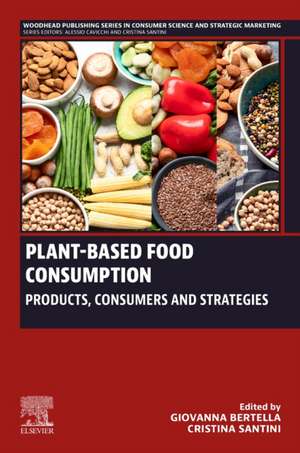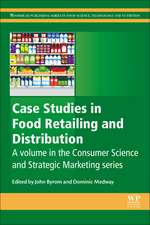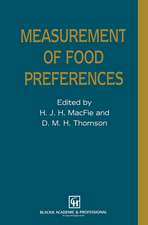Plant-Based Food Consumption: Products, Consumers and Strategies: Woodhead Publishing Series in Consumer Science and Strategic Marketing
Editat de Giovanna Bertella, Cristina Santinien Limba Engleză Paperback – 7 noi 2023
Food scientists, food developers, food marketers, academics and students studying related areas will benefit from this important reference.
- Provides a link between theoretical information and business practices
- Presents a comprehensive overview of the phenomenon of plant-based food consumption
- Contains valuable information upon which to formulate strategic business plans or to work on plant-based food consumption research plans and projects
Preț: 898.65 lei
Preț vechi: 1179.03 lei
-24% Nou
Puncte Express: 1348
Preț estimativ în valută:
172.01€ • 186.91$ • 144.58£
172.01€ • 186.91$ • 144.58£
Carte tipărită la comandă
Livrare economică 14-28 aprilie
Preluare comenzi: 021 569.72.76
Specificații
ISBN-13: 9780323988285
ISBN-10: 0323988288
Pagini: 346
Dimensiuni: 152 x 229 mm
Editura: ELSEVIER SCIENCE
Seria Woodhead Publishing Series in Consumer Science and Strategic Marketing
ISBN-10: 0323988288
Pagini: 346
Dimensiuni: 152 x 229 mm
Editura: ELSEVIER SCIENCE
Seria Woodhead Publishing Series in Consumer Science and Strategic Marketing
Public țintă
Food scientists, food developers, food marketers, academics and students studying related areasCuprins
1. Introduction
Section 1:
2. Identifying conditions and opportunities for more plant-based eating practices in the Western world
3. Consumption of plant-based foods: motives and drivers among Italian consumers
4. Offer me Inspiring Values; I do not care about Branding!
5. Emerging trends in healthy and sustainable eating: the case of fresh convenience plant-based foods
6. Generation Z and novel plant-based food alternatives
7. South Korean Buddhist temple food: experiential co-creation through time and space with intertwined operand and operant resources
Section 2:
8. Plant-Based Milk Alternatives: Consumer Needs and Marketing Strategies
9. Who are the flexitarians? Improved segmentation of plant-based meat consumersin the case of Germany
10. Effective communication of plant-based foods: A case study analysis of Danish and Italian markets
11. Plant-based meat packaging and consumer dietary habits
12. The challenging path towards a hydroponic indoor home cultivation system: educating a new consumer perception of vegetables
13. A hands-on framework for the design and implementation of plant-based food experiences
14. Fresh vegetables with a story: Market gardening for a sustainable food transition
15. The power of behavioural nudges tailored to plant-based dishes when eating out
16. Conclusion
Section 1:
2. Identifying conditions and opportunities for more plant-based eating practices in the Western world
3. Consumption of plant-based foods: motives and drivers among Italian consumers
4. Offer me Inspiring Values; I do not care about Branding!
5. Emerging trends in healthy and sustainable eating: the case of fresh convenience plant-based foods
6. Generation Z and novel plant-based food alternatives
7. South Korean Buddhist temple food: experiential co-creation through time and space with intertwined operand and operant resources
Section 2:
8. Plant-Based Milk Alternatives: Consumer Needs and Marketing Strategies
9. Who are the flexitarians? Improved segmentation of plant-based meat consumersin the case of Germany
10. Effective communication of plant-based foods: A case study analysis of Danish and Italian markets
11. Plant-based meat packaging and consumer dietary habits
12. The challenging path towards a hydroponic indoor home cultivation system: educating a new consumer perception of vegetables
13. A hands-on framework for the design and implementation of plant-based food experiences
14. Fresh vegetables with a story: Market gardening for a sustainable food transition
15. The power of behavioural nudges tailored to plant-based dishes when eating out
16. Conclusion
Recenzii
“I found this book very informative and useful to understand consumer needs and perceptions and what drives behaviour in the plant-based foods category, as this can be driven by ethical, health and environmental sustainability concerns or a combination of these… I would recommend this book to academics as a teaching resource, companies intending to enter or already in the plant-based space, as well as to media companies wanting to provide their readers with objective case study information on this very topical and debated issue…" --Professor Gunnar Sigge, FST Magazine





























